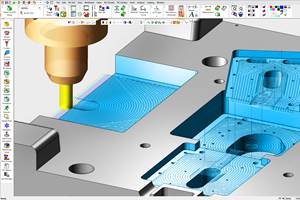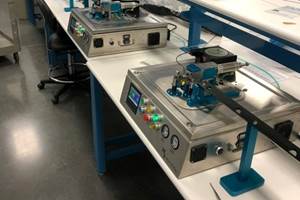New Wire EDM System Enhances Mold Maker's Capabilities
When Osley and Whitney, Inc. (Westfield, Massachusetts) decided to upgrade its wire EDM (electrical discharge machining) capabilities, the company had several problems it wanted to solve. Osley and Whitney, a 48-year-old plastic injection moldbuilding company with 68 employees, serves automotive, automotive aftermarket, consumer, sporting goods and office machine companies.
Share





When Osley & Whitney, Inc. (Westfield, Massachusetts) decided to upgrade its wire EDM (electrical discharge machining) capabilities, the company had several problems it wanted to solve. Osley & Whitney, a 48-year-old plastic injection moldbuilding company with 68 employees, serves automotive, automotive aftermarket, consumer, sporting goods and office machine companies.
The machine the company wanted to replace left a lot to be desired. "The workpiece deterioration with our old machine was driving us crazy," says Roger Beauregard, the company's vice-president of manufacturing. "We weren't able to cut a normal cavity seat in F7 or H13_especially over the weekend_not only because we didn't have an automatic wire threader, but also because when we came back to work the next morning or on Monday, we'd find the workpiece had turned into a pile of rust.
"We tried making molds out of 420 stainless steel. We tried coating the exterior surfaces with rust-inhibiting paint. We even tried putting grease on the workpieces. Unfortunately, the only solution that ever really worked was to have a production person on-hand at the end of every run to take the workpieces out and wipe them down immediately. That was a big handicap, of course, because when we wanted to have a long burn overnight or over a weekend, we couldn't do it."
The company decided to purchase a wire machine, the Robofil 330F from GFAGIECHilles Technologies (Lincolnshire, Illinois), to add to its five ram machines.
The new Robofil 330F's submerged operations and filtration system coupled with a dielectric of deionized water and an automatic wire threader solved the rusting problem. Osley & Whitney now cuts all kinds of steel, along with aluminum, graphite and copper, at all times of the day and night. "The filters last longer than we thought they would, and although we knew very little about filtration before we bought this machine, it's been a great help to us already," Mr. Beauregard says.
The machine has had other positive effects too, such as an improved cutting speed, much faster than the one it replaced. Roger Poirier, vice president of sales and engineering at Osley & Whitney, adds, "We verified the speed improvement and cost savings by running a distributor cap replacement job as a test. This design features two mating parts and a parting line that actually forms the outside shape of the part. Basically, this is a cone-shaped part that's larger on the bottom than at the top. It is loaded with fillet radii and scallops that ultimately produce a smooth exterior surface.
"When we ran the job in our old wire machine, it required 16 hours per cavity. When we ran the same job again on the new wire machine, it took four hours per cavity. What's more, with the GFAGIECHilles, we're able to generate the radii and put in the fillets, notches and scallops at the same time."
John Monaghan, company president, adds, "Now that we've upgraded, we've come to rely on wire EDM running up to 80 hours a week to generate all of the electrodes for our ram work. Of course, we also use wire to cut inserts for through-pockets and for other typical applications."
Making it easier to do taper-cutting in tall workpieces was another thing Osley & Whitney desired. "We found the new machine could cut 30-degree tapers up to 15.75 inches (400 mm)," says Mr. Poirier. "With most of the other machines we evaluated, they could cut 30-degree angles but not to the full range of the machine."
The new wire machine's Fanuc control unit has also been a plus. "We're very familiar with Fanuc controls," says Mr. Poirier, "And the control includes pre-set values allowing us to select optimal cutting speeds and feeds based on the materials and thicknesses we're running. The control asks a few on-screen questions, you press a button, and you're off and running."
The GFAGIECHilles Robofil 330F features X-Y-Z travels of 15.75 inches (400 mm) by 11.8 inches (300 mm) by 15.75 inches (400 mm), plus U-V travels of 19.68 inches (500 mm) by 15.75 inches (400 mm).
Related Content
How to Achieve Unmatched Accuracy in Very Large Workpieces
Dynamic Tool Corp. purchases two bridge-style double-column CNCs to increase the cutting envelope and maintain 5-micron cutting accuracy in the long term.
Read MoreCimatron's Updated CAD/CAM Software Streamlines Mold Design
Eastec 2023: Cimatron V16 includes a clean new user interface and increased automation for faster mold design, electrode creation and NC programming.
Read MoreLyndex-Nikken Collets Enable Accurate Small-Diameter Cutting
The MMC Mini-Mini collet chuck is well suited for high-speed machining applications where clearance is needed, such as die mold, aerospace and medical parts.
Read MoreFor This Machine Shop, Licensing Is the Answer to the Inventor’s Dilemma
Machine shops are natural inventors, but not necessarily suited to supporting and marketing a product. This Minnesota shop with an invention related to micromolding will share it through licensing.
Read MoreRead Next
Building Out a Foundation for Student Machinists
Autodesk and Haas have teamed up to produce an introductory course for students that covers the basics of CAD, CAM and CNC while providing them with a portfolio part.
Read MoreSetting Up the Building Blocks for a Digital Factory
Woodward Inc. spent over a year developing an API to connect machines to its digital factory. Caron Engineering’s MiConnect has cut most of this process while also granting the shop greater access to machine information.
Read More5 Rules of Thumb for Buying CNC Machine Tools
Use these tips to carefully plan your machine tool purchases and to avoid regretting your decision later.
Read More

































